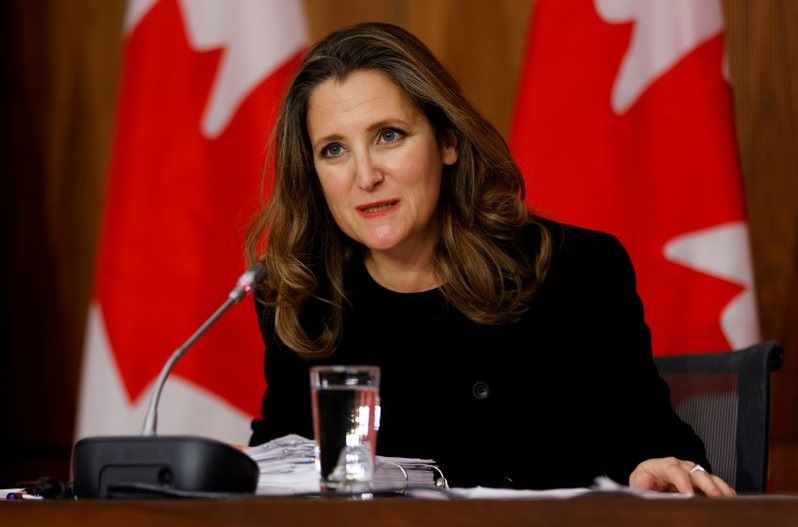Canada finds itself at a crossroads as it grapples with fiscal challenges, with its deficit targets seemingly slipping beyond reach. The nation’s largest financial co-operative, Desjardins, has sounded a cautionary note. They indicated that unless substantial spending cuts are implemented or new revenue sources are identified, Canada is poised to miss its deficit goals.
A Budgetary Precipice
According to estimates released by Desjardins on Thursday, Canada is hurtling towards a budget shortfall of approximately C$47 billion ($34.9 billion) for the fiscal year ending March 31. This alarming projection underscores the pressing need for decisive action to rein in spending or explore avenues for revenue generation.
Ministerial Pledges vs. Economic Realities
The figures cast doubt on Finance Minister Chrystia Freeland’s commitment to maintaining the country’s budget deficit at around C$40 billion annually until 2026. Randall Bartlett, Desjardins’ senior director of Canadian economics, emphasized the necessity for creative solutions, stressing that either spending must be curtailed or revenues augmented to align with the deficit targets.
Economic Growth Stifled by Fiscal Uncertainty
The looming specter of widening deficits amid sluggish economic growth has prompted a chorus of warnings from analysts and economists. Without tax hikes or expenditure cuts, deficits are likely to escalate, further straining Canada’s fiscal outlook.
Corporate Tax Dilemma
The possibility of increased corporate taxes has sparked concerns among business groups, fearing adverse effects on investment. However, Randall Bartlett downplayed the likelihood of such a move, citing its potential repercussions on the investment climate. Instead, he suggested that the government may explore unexpected savings or asset divestments to alleviate the deficit burden.
Uncertainties on the Horizon
Yet, uncertainties loom large on the horizon. The government’s proposal to introduce a new program subsidizing diabetes medication and contraceptives adds complexity to an already precarious fiscal landscape. Coupled with potential military spending hikes, the situation becomes even more challenging.
Navigating Fiscal Headwinds
Randall Bartlett warned against the risks of persistent deficits, cautioning that such practices could undermine Canada’s fiscal credibility and AAA credit rating. Despite these challenges, Canada’s position remains comparatively favorable. It’s compared to other advanced economies grappling with higher debt burdens and larger deficits.
Hope Amidst Uncertainty
In a separate report, economists at Toronto Dominion Bank echoed similar sentiments. They acknowledged the likelihood of a deeper deficit this fiscal year. However, they remained cautiously optimistic, citing better-than-expected economic growth as a potential mitigating factor.
Charting a Prudent Path
As Canada navigates these fiscal headwinds, the onus lies on policymakers to chart a course that balances economic stability with fiscal prudence. The decisions made in the coming months will undoubtedly shape the nation’s financial trajectory for years to come. This underscores the importance of prudent fiscal management in uncertain times.
Subscribe to Barron’s and The Wall Street Journal for transformative insights and swift, personalized service. Elevate your financial confidence with unwavering guidance, diverse perspectives, and groundbreaking ideas, ensuring you stay ahead in the dynamic world of global finance. Join us for a journey where convenience meets comprehensive coverage. To purchase a subscription, call WSJ Cell Phone: (800) 581-3716

